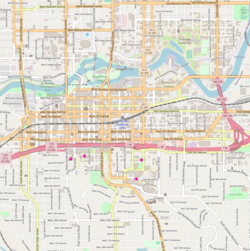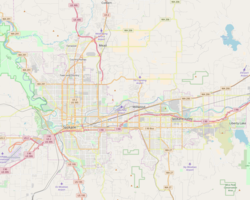Natatorium Carousel | |
 | |
| Location | Riverfront Park Spokane, Washington |
|---|---|
| Nearest city | Spokane |
| Coordinates | 47°39′38.42″N117°25′12.99″W / 47.6606722°N 117.4202750°W |
| Built | 1909 |
| Architect | Charles I. D. Looff |
| NRHP reference No. | 77001362 |
| Added to NRHP | September 19, 1977 |
The Riverfront Park Carousel, also known as the Looff Carrousel and the Natatorium Carousel, is a carousel in Spokane, Washington built in 1909 by Charles I. D. Looff as a gift for Looff's daughter Emma Vogel and her husband Louis Vogel, who owned Natatorium Park in Spokane. [1] It remained at Natatorium Park until 1968 when the park closed. The carousel was then relocated to its present location at Riverfront Park in 1975 where it continues to operate. [2] [3] It was added to the National Register of Historic Places on September 19, 1977. [4]
Contents

The Looff still contains its original 1900 Ruth & Sohn band organ, which plays 87 key B.A.B. rolls, although due to deteriorating player rolls, a digitized recording is played during the carousel's operation. [3] The organ was manufactured in Waldkirch, Germany and imported by Looff around 1900. The carousel contains 54 horses, one giraffe, one tiger, one goat and two chariots, all hand carved by Looff himself. It also has a ring dispenser, which allows the outside riders to grab a ring during each pass and then toss the ring at a clown with a hole in his mouth. If the rider is successful in capturing the brass ring, they can turn it in to win a free ride on the carousel. [5]




